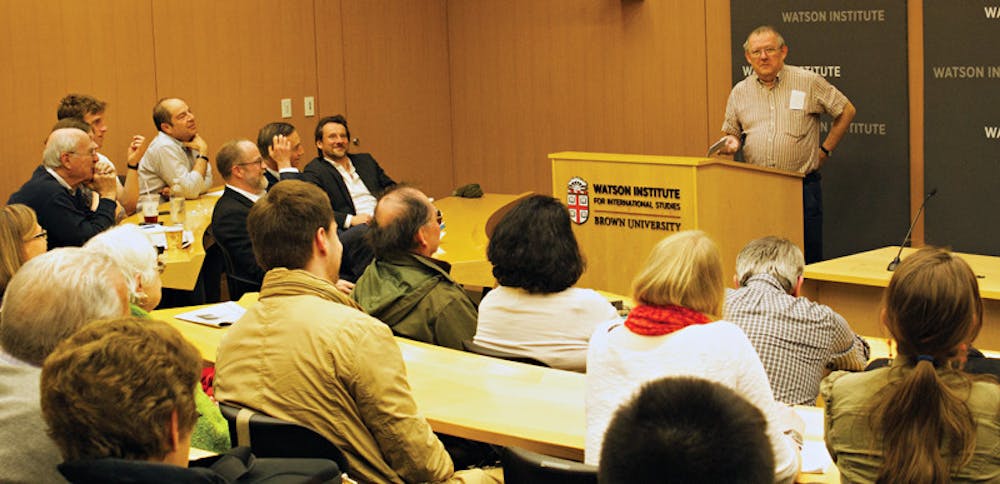With his blunt rhetoric, spirited hand gestures and puffs off an electronic cigarette, Adam Michnik gave over 50 people a taste of his rebellious nature at a lecture Monday in the Joukowsky Forum at the Watson Institute for International Studies.
At the talk, entitled “The Traps of Democracy after Communism,” Michnik discussed the connections between Ukrainian and Polish politics vis-a-vis Russia, emphasizing the threat he said Russian President Vladimir Putin poses to democracy.
“I’m from a generation that lived through a miracle,” Michnik said.
Michnik conducted the lecture in Polish. His jokes triggered two rounds of laughter — one as Polish speakers heard the lines, and a second as student translators rendered them accessible to non-Polish speakers.
Michnik was a central figure in Poland’s struggle against communist rule, said Michael Kennedy, professor of sociology and international studies, who introduced the lecture. While spending six years in prison for rebelling against the Polish communist regime, Michnik “became a prolific writer,” engaging with comrades and jailers, Kennedy said.
In 1989, Michnik participated in the Polish Round Table Talks, which contributed to Poland’s nonviolent transition to democracy. He later served for two years as a deputy in Poland’s first non-communist parliament and founded the Gazeta Wyborcza, a daily newspaper of which Michnik is currently editor-in-chief. He has written many books, essays and analyses that have been translated and received many honors, including the Robert F. Kennedy Human Rights Award and the Order of the White Eagle, the highest distinction attainable in Poland.
But in his lecture, Michnik did not dwell on his past. His words fixated on recent events and threats, drawing historical correlations.
“What happened in Ukraine has been a huge surprise for the world,” Michnik said, adding that Russia is the biggest threat to Ukraine’s democratic transition.
Putin will certainly attempt to put a stop to the Ukrainian presidential election, he said, asking the room, “How long are we going to give in to Putin, whose appetite is comparable to a shark’s?”
“It’s extremely important that the international community finds a way to stop Putin,” Michnik said, adding that it is risky to communicate with a man “who after shaking hands (with), you have to count your fingers.”
Michnik stressed Ukraine’s state of unrest, adding that infiltration of the Ukrainian police and military structures by the Russian secret service police has contributed to the problem.
Both Russia and Ukraine carry historical baggage, Michnik said. “For Russia, this baggage is the burden of imperial history. For Ukraine, … it is the burden of the interwar and postwar period,” when independence movements came to fruition. While speaking about Ukraine, Michnik acknowledged there also exists a “bloody past” between Poland and Ukraine.
Michnik also sounded a warning about Russia’s encroachments in neighboring countries. “Putin’s action on the Ukrainian peninsula … is reminiscent of Hitler’s invasion” of Sudetenland, Michnik said. “By no means do I want to say that Hitler and Putin are the same people, but the mechanisms employed by Putin are very similar to Hitler’s.”
If Ukraine survives the conflict, Michnik said, the nation can learn from Poland’s successful democratic transformation. Along the way to democratization, Ukraine will face parallel challenges, including “managing economic transformation and corruption,” he added.
In a question-and-answer session after the lecture, attendees asked Michnik for his perspective on the Polish government, Hungarian politics and U.S. foreign policy. He offered detailed responses sprinkled with humor.
When asked what he would say if he were given the chance to chat with President Obama, Michnik said, “If I were a student taking an exam with you, I would say, ‘Could I have a different set of questions please?’”
Michnik was “very happy” when Obama was elected “because it changed the face of the United States internationally,” he said. But Michnik believes Obama needs “to find a new language,” because compromise won’t work with Putin, he added.
“I would say to him, ‘Mr. President, you are dealing with a gangster, and you can’t go (into) the ring with him with one of your hands tied back. You need to have both fists,” Michnik said.
To conclude the lecture, Michnik emphasized that a language that is “anti-Putin but not anti-Russian” will be needed to ease international tension and find a solution in Ukraine. “Russians learn daily from television that Americans want to harm and hurt Russia,” he said. “The natural weapon of discourse is the lie. … We need to find a solution, a way to respond to this propaganda.”
Michnik said he is optimistic about the future. He envisions Ukraine moving “towards the direction of Europe,” while “dragging” Russia along the way, he said.
Jana Fox ’16, an Ireland native who attended the lecture, said she found Michnik’s hopeful perspective to be refreshing, especially in contrast to “the doomsday view” of the Ukrainian crisis in western media.
Poland’s democratic transition gives Michnik hope for Ukraine, but he acknowledged the chaotic reality of the world.
“Nobody is able to predict what is going to happen tomorrow or the day after tomorrow,” he said.

ADVERTISEMENT




